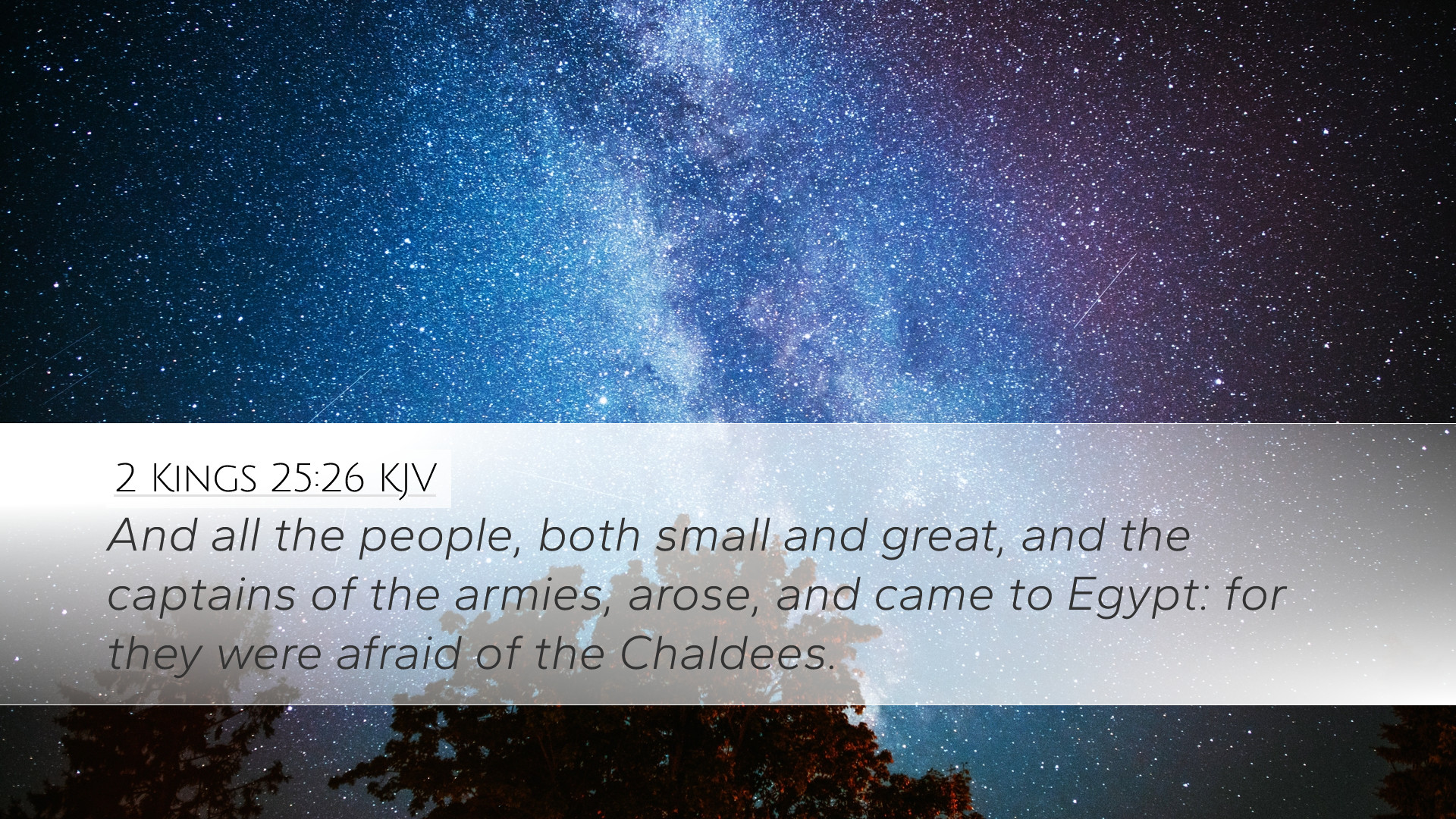Commentary on 2 Kings 25:26
Bible Verse: "And all the people, both small and great, and the captains of the armies, arose, and came to Egypt: for they were afraid of the Chaldees."
Introduction
This verse concludes the tragic account of the Babylonian siege of Jerusalem and signifies a profound moment in the history of Israel. The destruction wrought by the Chaldeans instilled a great fear among the people, propelling them toward Egypt as a place of refuge. This commentary synthesizes perspectives from notable public domain scholars.
Historical Context
According to Matthew Henry, this passage is deeply rooted in the historical collapse of Judah following the fall of Jerusalem. The Babylonian exile was not just a physical displacement but also a spiritual crisis. The people’s flight to Egypt demonstrates a return to reliance on foreign powers instead of trusting in Yahweh, their covenant God.
- Albert Barnes: In his analysis, Barnes highlights the significance of the people’s fear as they grappled with the devastation left by the Chaldeans. Their decision to flee to Egypt underscores a lack of faith and understanding of God’s sovereign plan.
- Adam Clarke: Clarke adds that their movement to Egypt not only reveals their anxiety but also reflects a historical pattern of looking to Egypt for help, which God had previously warned against.
Theological Insights
This verse illustrates fundamental themes related to fear, reliance, and the consequences of disobedience. The decision to flee is emblematic of a deeper theological crisis and the condition of the human heart in times of turmoil.
- Fear as a Motivator: The overwhelming fear of the Chaldeans prompted many to abandon their homeland. Barnes notes that fear often leads individuals away from faith and toward reliance on potentially harmful decisions.
- Rejection of Divine Refuge: The people opted for Egypt, a symbol of bondage in their history. Clarke comments on the tragic irony that, instead of turning to God, they returned to the land of their former oppression.
Exegetical Analysis
Examining the original Hebrew, the term used for "afraid" indicates an acute stress and terror gripping the hearts of the people. Henry suggests that this fear was not unwarranted but rightly connected to their rebellion against God, culminating in their current plight.
Pastoral Applications
For pastors addressing this scripture, the themes present can resonate deeply in the lives of contemporary congregations. Here are some points to consider:
- Addressing Fear: Just as the Israelites were driven by fear, modern believers can find themselves in similar circumstances. Pastors should encourage their congregations to confront their fears with faith in God, rather than fleeing to 'Egypt'—misplaced security.
- The Importance of Trust: Reliance on God is paramount. This passage serves as a reminder that turning to God in times of trouble is more beneficial than seeking refuge in worldly solutions.
Conclusion
2 Kings 25:26 holds significant weight in understanding the psyche of the people of Judah at the bitter end of their sovereignty. Fear drove them to Egypt, showcasing a rejection of their covenant relationship with God. Scholars like Henry, Barnes, and Clarke collectively emphasize the importance of faith amidst fear and the peril of seeking refuge in worldly entities. As we reflect on this verse, let it serve as a caution to remain steadfast in God’s promises and seek His guidance, even amidst crisis.


